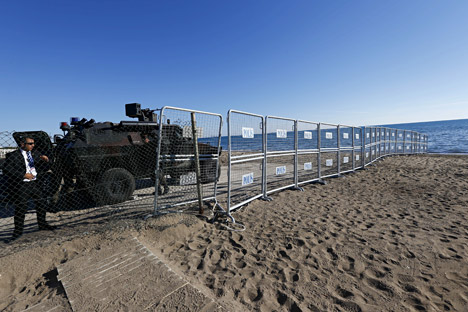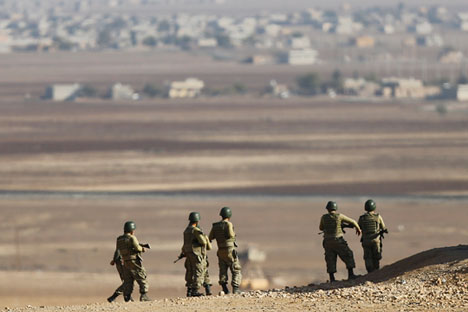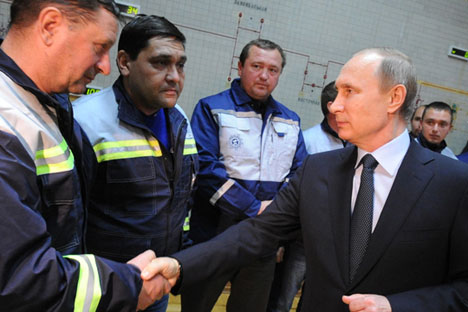Russian sanctions may cost Turkey up to 3 percent of its GDP

Turkish security officers stand behind barriers at a beach as they secure the summit zone ahead of the G20 summit in Belek in the Mediterranean resort city of Antalya, Turkey, Nov. 14, 2015.
ReutersTurkish Vice Premier Mehmet Simsek has estimated Ankara’s losses from its current tensions with Russia at $9 billion a year. He predicts that in the worst-case scenario, Russian sanctions will cost Turkey 0.4 percent of its GDP, adding that this year Turkish exports to Russia have already dropped by 30-40 percent. The number of Russian tourists in Turkey has also fallen drastically (by 600,000 people), as has the number of construction projects being carried out by Turkish companies in Russia.
“Russia has always been an important partner to us, and we do not want conflicts with it. From the very first days, we developed ways of tackling the crisis, all our sectors are ready for it,” Simsek said in an interview with the Russian TV channel NTV.
However, this assessment appears to be underestimating the likely losses. According to the European Bank for Reconstruction and Development, Russian sanctions may slow down Turkey’s economic growth by 0.3-0.7 percentage points in 2016.
Losses plus inflation
Other experts estimate Turkish losses at more than twice that amount. For instance, parliamentarians from the Turkish Republican People’s Party have calculated that in total Turkey may lose some $20 billion, or 3 percent of its GDP, as a result of Russian sanctions. This figure includes $6 billion in revenues from Turkish exports to Russia, $7 billion in revenues generated by Russian tourists, and $6 billion in revenues from shuttle trade, according to parliamentarian and head of the Antalya Chamber of Commerce and Industry Cetin Osman Budak, as quoted by the Turkish newspaper Hurriyet Daily News.
This figure looks closer to reality. The loss of Russian tourists alone will cost Turkey $10 billion, since this is what Turkey itself estimated its revenues from Russian tourists at. Antalya alone will lose $6 billion, with $500 million lost in the agricultural sector, according to a former mayor of Antalya, parliamentarian Mustafa Akaydin. According to official estimates, however, the Turkish tourist sector will lose just $3.5 billion.
“In my view, the overall losses of the Turkish economy will be closer to $20 billion,” said Georgy Vashchenko from the Freedom Finance investment company. “It will for a long time be impossible to recover losses from the drop in tourist flows, $6-8 billion a year, and from exports, a total of over $10 billion, including shuttle trade, which too will drop given higher transport costs.”
Furthermore, said Vashchenko, Turkey’s losses may increase if the situation in the Turkish economy deteriorates. “So far, the Turkish lira has remained largely immune to political events, it has already lost 30 percent of its value this past year. However, with the start of the embargo, things may change and a 3-percent drop in GDP because of export losses will add at least 2 extra percent to inflation,” he said.
Not only tomatoes
In the meantime, it cannot be ruled out that Russia may introduce sanctions against Turkey in other segments. Russia has the capacity to bring in further restrictions, which could hit the Turkish economy badly without doing any considerable harm to the Russian markets. For example, Raiffeisenbank analysts point out, Turkish exports to Russia also include clothes and footwear (worth $1 billion in 2014; 15.1 percent of imports from Turkey and about 7 percent of all clothes and footwear imports into Russia); land transport (11.5 percent of imports from Turkey), machinery and white goods (11.2 percent of imports from Turkey). New economic sanctions against Turkey or/and a deterioration of the situation in the Turkish economy may therefore result in GDP losses of more than 3 percent.
In all these cases, the losses being considered do not include lost benefits from unrealized projects, such as the Turkish Stream gas pipeline, the Akkuyu nuclear power plant and various construction projects in Russia being carried out by Turkish companies.
Turkey still needs gas
Of course, Ankara itself was stalling on the signing of the necessary documents for the Turkish Stream gas pipeline project in the hope of securing better terms for itself. As a result, Russia has already halved the number of planned lines of the pipeline from four to two, which meant a loss of future transit revenues for Turkey for supplying gas to the Balkans via its territory. However, while the decision to scrap Turkish Stream frustrates Russia’s aims of avoiding gas transit via Ukraine, it may result in still more serious consequences for Ankara in the future.
The thing is that the first line of the prospective gas pipeline was meant to meet Turkey’s own requirements in gas. At the moment, Turkey receives some 14 billion cubic meters of gas from Russia via the Trans-Balkan pipeline, through Ukraine and Romania. However, the term of the transit agreement between Russia and Ukraine expires in 2019. Unless Kiev and Moscow can come to a new agreement, this would partially end Russian gas supplies to Turkey. The first line of the Turkish Stream pipeline was supposed to supply the amounts currently coming via Ukraine. Ultimately, there is a risk that Turkey is not only stripping itself of the opportunity to receive revenues from gas transit to Europe, but it will also be unable to increase gas consumption on beneficial terms and to secure its economy against the loss of gas supplies via Ukraine.
As regards the Akkuyu nuclear power plant, this project, on the whole, was advantageous first and foremost for Turkey, since Russia, which took on all the construction and maintenance costs, risked spending the next 20 years recouping these costs – to say nothing of the fact that Russia was in effect creating competition for its own gas on the Turkish market.
In effect, Turkey is robbing itself of the opportunity to have cheaper electricity than electricity generated by gas heat and power plants. The Turkish authorities have been saying for a long time that they should build a nuclear power plant. Had the country got nuclear power 10 years ago, it would have saved $14 billion on buying natural gas. The decision to abandon plans to build a nuclear power plant would mean the need to spend more on gas, which in the end may land Turkey with the highest electricity tariffs in Europe.
First published in Russian in Vzglyad.
Read more: Russian economy moves out of recession>>>
All rights reserved by Rossiyskaya Gazeta.
Subscribe
to our newsletter!
Get the week's best stories straight to your inbox

